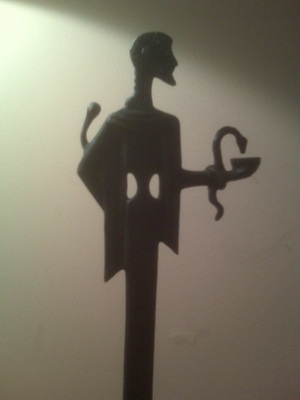
Our dreams tell us what is going on inside our bodies. This can help us avoid medical problems. When we do have a problem, our dreams can be a reliable source of diagnosis. Here is Janice’s story of a dream that helped to alert her and her doctor to a problem he had missed:
When I was in my late twenties. I went to the doctor for my annual check up. My doctor gave me a clean bill of health. The night after my visit to his office, I had the following dream:
I am screaming at the doctor, “I told you to check my arm. Now, look! You had to cut it off.” As I’m screaming at the doctor, I am looking at my right arm which has been cut off above the elbow. My arm is wrapped in gauze.
Upon waking from my dream, I had a very troubling, heavy feeling that I could not shake off. I immediately called my doctor and told him – not a request – that I would be coming in that very day to have him check my right arm. He insisted that I was fine. I told him about my dream, and insisted that no matter what I was coming in to see him.
When I got to the office my doctor checked my arm. After examining my arm the doctor said, “You know, your arm doesn’t look right.” There was a slight purplish hue to a part of my skin, the size of mosquito bite. The doctor suggested that I see a surgeon. I went to the surgeon who decided to remove the little bump. The little bump however, turned out to be a tumor the size of a very large green grape that was hidden deep under my skin. The tumor had begun to change and, fortunately, it was fully encapsulated when removed.
I have a scar on my right arm an inch above the elbow, at exactly the place where my arm had been cut off in my dream. I’m grateful for that scar, because it is a daily reminder of the importance of paying attention to dreams.
I look forward to the day when our doctors are schooled to look to dreams, along with other resources, for diagnosis of complaints, as they were in the ancient world.
Aristotle noted that the most successful physicians paid close attention to their patients’ dreams. Throughout the Hippocratic corpus – the large body of ancient medical texts attributed to Hippocrates, the great early physician from whom the oath of our medical profession is derived – the diagnostic value of dreams is recognized again and again. The author of the Hippocratic treatise On Regimen [fourth century BCE] tracks dreams that foreshadow physical symptoms and reveal their progress. He maintains that in sleep “the soul becomes its own mistress” and is able to tour its bodily residence without distractions. In the morning, it leaves the dreamer some pictures from its nightly tours. To read the diagnostic meaning of these souvenirs, we need to recognize that inside the body is a whole world. Thus earth, in a dream, may represent the body as a whole. A river may be the blood, a tree (for a man) or a spring (for a woman) the reproductive system.
Second only to Hippocrates, Galen (128-210) was the most important person in the rise of Western medicine. As he recorded medical case histories, Galen paid close attention to the appearances of the god Asklepios in diagnosing and prescribing for different ailments, and in facilitating direct healing. He was in no way superstitious. It would have been irrational, from his perspective, not to work with a friendly god who could fix the parts other medicine could not reach – and demonstrated this again and again. The surviving text of Galen’s essay On Diagnosis from Dreams shows his no-nonsense approach. He explains that dreams can provide accurate diagnosis because during sleep the soul travels inside the body and checks out what is going on.
Notes on dream diagnosis in ancient Greek medicine are adapted from my Secret History of Dreaming (New World Library, 2009).

